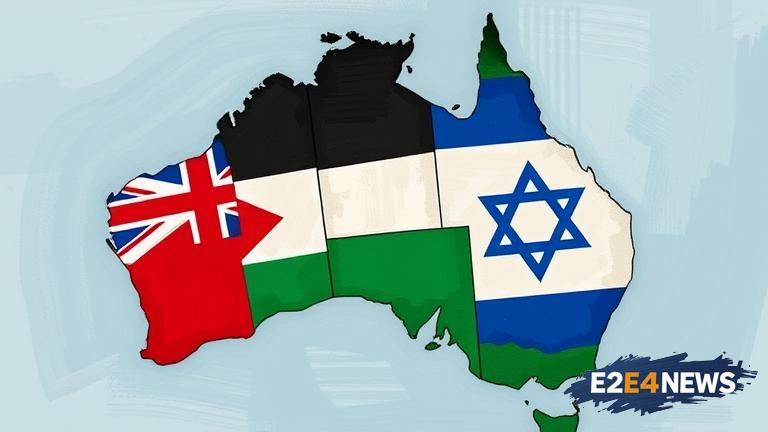The Australian Foreign Minister, Penny Wong, has issued a stark warning that the world is rapidly approaching a point of no return in the pursuit of a two-state solution in Palestine. In a recent statement, Wong emphasized the urgent need for the international community to come together and support the establishment of a sovereign Palestinian state, alongside a secure and recognized Israel. The Minister’s comments come as the Israeli-Palestinian conflict continues to simmer, with ongoing settlement expansion, violence, and humanitarian crises in the Gaza Strip and West Bank. Wong’s warning is a timely reminder that the two-state solution, long considered the most viable path to peace, is facing unprecedented challenges. The Australian government has consistently supported a two-state solution, and Wong’s statement reflects a growing sense of concern that the window for achieving this goal is rapidly closing. The Minister’s comments were made during a recent visit to the Middle East, where she met with Israeli and Palestinian leaders to discuss the prospects for peace. Wong emphasized that Australia remains committed to supporting a negotiated settlement, based on the principles of international law and UN resolutions. However, she also acknowledged that the current trajectory of events is deeply troubling, with the Israeli government’s continued expansion of settlements and the Palestinian Authority’s struggles to maintain control. The Australian government has long been a strong supporter of the Palestinian people’s right to self-determination, and Wong’s statement reflects a deepening concern that this right is being eroded. The Minister’s warning is not just directed at the Israeli government, but also at the international community, which she believes has a critical role to play in supporting the peace process. Wong emphasized that the establishment of a two-state solution requires a concerted effort from all parties, including the United States, Europe, and the Arab world. The Australian government has pledged to increase its support for Palestinian humanitarian programs, and Wong announced a new package of aid during her visit to the region. However, the Minister also acknowledged that humanitarian assistance alone is not enough, and that a lasting solution requires a fundamental transformation of the political landscape. The two-state solution has been the cornerstone of international policy on the Israeli-Palestinian conflict for decades, but it is facing unprecedented challenges. The Israeli government’s continued expansion of settlements, the rise of extremist groups, and the Palestinian Authority’s struggles to maintain control have all contributed to a sense of despair and hopelessness. Wong’s warning is a timely reminder that the international community cannot afford to give up on the two-state solution, and that a concerted effort is required to support the peace process. The Australian government’s commitment to a two-state solution is unwavering, and Wong’s statement reflects a deepening concern that the window for achieving this goal is rapidly closing. The Minister’s comments have been welcomed by Palestinian leaders, who have long argued that the international community needs to do more to support their right to self-determination. However, the Israeli government has responded cautiously, with some officials expressing skepticism about the feasibility of a two-state solution. Despite these challenges, Wong remains optimistic that a two-state solution can be achieved, and that the international community has a critical role to play in supporting the peace process. The Australian government’s commitment to a two-state solution is reflected in its support for UN resolutions and international law, and Wong’s statement emphasizes the need for all parties to adhere to these principles. The Minister’s warning is a stark reminder that the Israeli-Palestinian conflict is not just a local issue, but a global one, with far-reaching consequences for regional and international stability. The international community has a critical role to play in supporting the peace process, and Wong’s statement emphasizes the need for concerted action to achieve a two-state solution. The Australian government’s support for a two-state solution is not just a matter of principle, but also of pragmatism, recognizing that a lasting solution requires a fundamental transformation of the political landscape. The Minister’s comments have sparked a renewed debate about the prospects for peace in the Middle East, and the role that the international community can play in supporting the two-state solution. As the situation on the ground continues to deteriorate, Wong’s warning is a timely reminder that the world cannot afford to give up on the two-state solution, and that a concerted effort is required to support the peace process.





